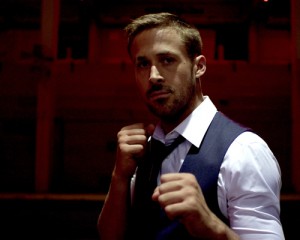Refn delivers style without substance in Only God Forgives
Only God Forgives, the second collaboration between director Nicolas Winding Refn and actor Ryan Gosling, fails to live up to the brilliance and intensity of Drive, their first movie together. The film premiered at Cannes to tepid reviews and is set for a July 19 release in the U.S.

Father, forgive me · Julian (Ryan Gosling) teams up with his mother, Crystal (Kristin Scott Thomas) to enact revenge in the slums of Bangkok. This marks the actor’s second collaboration with director Nicolas Winding Refn. – Courtesy of Wild Bunch
The film follows international drug lord Crystal (Kristin Scott Thomas), who travels to Bangkok to claim the body of her youngest son when he is found dead days after murdering a young prostitute. She calls on her other estranged son, Julian (Gosling), to support her in her quest for revenge, even as a redemptive local policeman (Vithaya Pansringarm) aims to wipe them both out in an effort to cleanse the city’s underbelly of crime.
Refn certainly can’t be faulted for his colorful style and cinematography, which remain exquisite. Just as he did with Los Angeles in Drive, Refn lovingly instills the city of Bangkok with his trademark neon colors, managing to carefully tread the line between visual poetry and tawdriness. The seediness and eccentricity of the location shooting lend a twisted, almost mythical aura to the images, aided by the prominence of Buddhist motifs and statues.
Though faster paced than the measured rhythm of Drive, Only God Forgives still plays with time and deliberately staggered shots within a framework of explosions of color — think Wong Kar-Wai slowed down so as to attempt cinematic philosophical contemplation. Each of Refn’s shots is beautiful, even if at times this seems to restrict the image’s spontaneity and limit the shock inherent in the film’s outbursts of violence.
Nevertheless, the lack of a driving force behind the characters and the flimsy plot will ultimately relegate the film to DVD back catalogs. The lack of contextualization renders the violence gratuitous -— it even makes Quentin Tarantino look tame — while the minimal attention paid to characterization leaves the viewer wondering whether this is meant as deliberate and unsuccessful artistic ambiguity or if it simply betrays the writer-director’s lack of investment.
While the relationship between Crystal and Julian sets up several potentially perverse and interesting narrative strands, the film settles instead for negligible plot development and a reliance on its own aesthetics that borders on pretentious. Rather than complement the stunning cinematography with a revenge quest of equal power, Refn chooses to rely entirely on his visual mastery and experimentation, sidestepping his own insubstantial narrative in favor of self-determined artistic excess.
Thomas’ performance as the no-nonsense, tacky yet refined mother acts as one of the film’s few saving graces; she delivers the most compelling lines in the sparse script with panache and charisma. Straddling the line between a drug-infused ‘hoochie mama’ and a caring mother, she approaches the performance with obvious enjoyment and delights in a character so different from her previous roles.
By contrast, Gosling seems to have abandoned the strength and quiet concentration that defined his performance in Drive in favor of an inaccessible stance so far removed from the spectator that even Clint Eastwood would surely protest. Even his good looks and his suave aura can’t save him here; at times his non-acting borders on offensiveness before a savvy film audience, and even more so for fans of Refn’s previous work.
Only God Forgives is so similar to Drive it can’t help but invite comparison, and falls short of its inspiring predecessor in every aspect. Where Drive’s sparse dialogue generates intensity and adds ambiguity to the characters, Only God Forgives creates overly composed silences that frustrate rather than narrate, stressing the extreme stylization of the film in a completely negative way.
Entire scenes are staged as semi-static tableaus, through a privileging of stillness in the acting and blocking that comes off as staid and redundant rather than mythical or sacred. Similarly, while the soundtrack of Drive offers an emotional extension of the film’s inner psyche, in Only God Forgives the incessant quirky Thai music feels overtly out of place in a move that countless previous directors have done better than Refn; it seems to follow a trend rather than add its own flavor. The ’80s synth that spoke volumes in Refn’s previous film now begs to be silenced, failing to capture character dynamics, atmosphere or anything of real value beyond repetitive noise.
While Drive stakes its claim as the ideal marriage of style and substance, Only God Forgives sacrifices the latter in favor of the former, ignoring the possibilities that could have propelled this semi-coherent revenge story to a more compelling level. While Only God Forgives’ style is glorious, the heart and general makeup of its story are so vapid that the spectator is challenged to care about the outcome of the film or of any of the characters, making the movie an unfortunate disappointment among this year’s summer releases.
